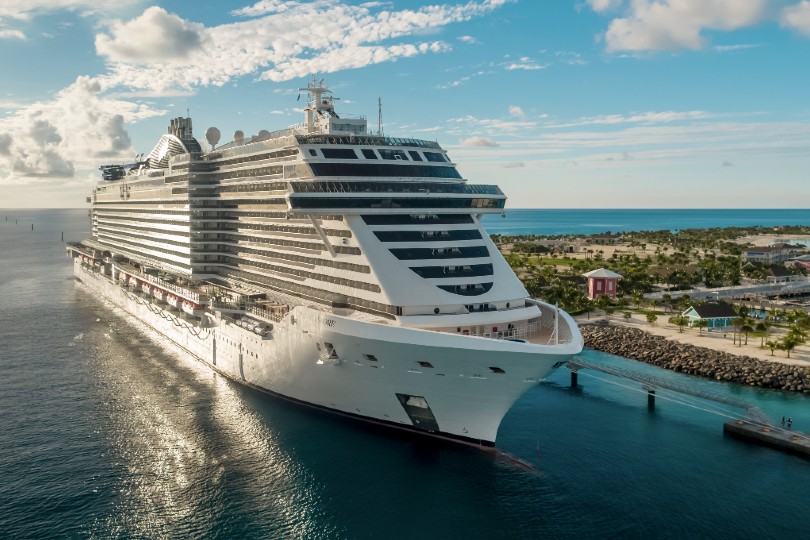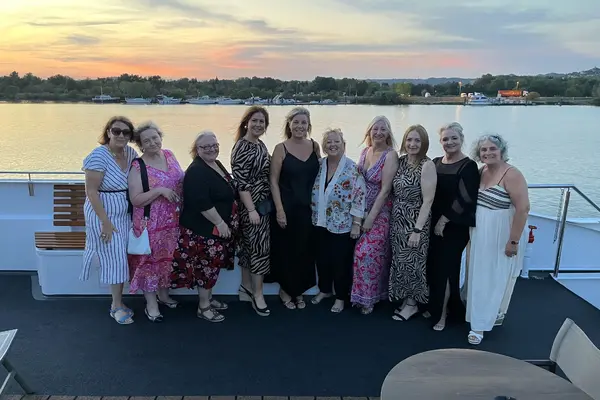MSC chair makes sustainability vow at Seashore naming
 Tom Parry
Tom ParryMSC Cruises has christened its 19th vessel and new flagship, MSC Seashore, at its Bahamian private island and marine reserve, with the line’s chair vowing to “accelerate” MSC’s sustainability efforts.
Seashore, sister to MSC Seaside and MSC Seaview and the first of the line’s Seaside Evo class ships, arrived in Ocean Cay for the first time on Thursday (18 November).
The island, a former aragonite sand mine, was purchased by MSC in 2015 and has been redeveloped in partnership with the Bahamian government.
A three-year restoration project has seen 7,500 tonnes of industrial scrap metal removed from the island and 75,000 plants and shrubs planted, while 64 square miles of Ocean Cay’s waters are now protected.
During the christening ceremony held onboard Seashore, MSC Cruises executive chair Pierfrancesco Vago said it was "a dream come true" to see Ocean Cay’s transformation come to fruition, six years after he conceived the redevelopment plan.
"A project like this required passion and devotion,” he said. “Ocean Cay is a core part of our drive to be a more sustainable industry and help save our blue planet.”
Vago described how the world was at a “critical point” in its fight against climate change but stressed MSC and the wider sector had “the vision and know-how” to address the challenges and offer solutions.
“MSC Seashore is the greenest ship in our fleet," he said. ’And [with] the next ship we build, we will take another step further and the one after until we reach net-zero carbon – that’s the promise."
Vago also described how a new MSC Foundation marine research centre was being built on Ocean Cay, with the breaking-ground ceremony also taking place on Thursday (18 November).
He said it would contribute to MSC’s coral restoration efforts and boost education and awareness on the issue, with guests set to be “actively involved” with future activities.
Speaking at an earlier press conference on Thursday, Vago outlined other ways MSC was investing in sustainability; these include several upcoming LNG-powered (liquefied natural gas) vessels, such as World Europa in 2022, and shore power technology at the line’s Miami terminal, currently under construction and due to open in 2023.
Vago said he believed LNG was a “transitory solution” to help the cruise industry achieve net-zero carbon operations by 2050. “If there was a provider who gave me green LNG, then ships would be at zero emissions immediately," he said.
"But as yet, LNG is a fossil fuel so there is an impact. We’re doing an incredible job as an industry to accelerate and bring in new technologies.”

In July, MSC announced it had partnered with Italian energy firm Snam and shipbuilder Fincantieri to explore hydrogen power for cruise ships.
Vago said MSC’s development team was spending “incredible amounts of time” exploring the opportunities around hydrogen power and was “engaging with fuel providers” to create greener power.
The company was also looking at using fuel cell technology to store more energy onboard ships, he said. “The cruise industry is doing an incredible job but I don’t think we communicate enough and we don’t show our leadership and the technology we have to improve emissions and the environment.
“At MSC, we’re engaging with the public sector, with governments, and with the regulators, to try to understand how we can accelerate the process.”
Sign up for weekday travel news and analysis straight to your inbox

Tom Parry
Supplier Directory
Find contacts for 260+ travel suppliers. Type name, company or destination.














